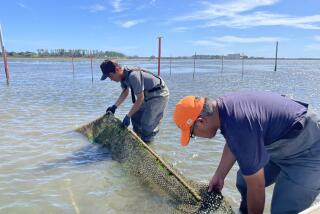Arctic Fishermen Fight Chill in Economy : Norway: As jobs disappear, many people are being forced to leave their harsh but beloved homeland.
- Share via
TROMSOE, Norway — The tough Norwegians of the north can ride out the savage storms, the isolation and the winter darkness that lasts for two months. It is the region’s shattered economy that is forcing many to leave.
“Most people very strongly want to stay here. I can’t explain it. It’s hard to make the people of south Norway understand, much less foreigners,” said Vigor Rossvaer, a University of Tromsoe researcher.
For unemployed fisherman Vidar Esbensen, the answer is simple: “This is home.”
The Norwegian Arctic is vast, sparsely populated and beautiful, with snowcapped mountains sloping down into the fiords and the northern lights staging nightly shows. But gorgeous scenery doesn’t pay the mortgage.
Unemployment, alcoholism and the death rate have long been higher than the Norwegian average. Then, in January, codfish quotas were slashed to protect declining Barents Sea stocks, putting a chokehold on the region’s main income.
“You can’t live on the quota, and you don’t quite die from it either,” said Esbensen, 35, who was thrown out of work when the cod quota was cut to 130,000 tons from 350,000.
In early February, the government offered a $77-million bailout package--mainly interest relief on state loans--to tide fishermen over while long-term solutions are sought.
Disappointed fishermen called the package “a Band-Aid on a bullet wound” and threatened strikes.
In the northernmost province of Finnmark, unemployment is 7.7%,compared to 3.9% in Oslo, Norway’s capital. The county population has been falling for 40 years, and it dropped by 6.8% in the last decade to 75,000.
A survey of those who left indicated that 51.6% sought better jobs or schools, while 22.7% said they were driven off by bad weather and the depressing 24-hour winter nights.
Rossvaer said the north is a victim of ecology, economy and even world politics. International pressure forced an end to whale hunting, an important industry.
Improving relations with the Soviet Union is both menacing and encouraging, especially in Finnmark, which curls eastward, as if on a map maker’s whim, over northern Sweden and Finland to butt against the Soviet Union along a 122-mile border.
Some residents fear a scaling back of the permanent military presence and periodic North Atlantic Treaty Organization maneuvers, which brought airports, bus services, roads and employment to the north. On the other hand, an open Soviet border could mean income from trade and tourism.
Business analyst Sven Oppegaard predicts a reconstruction of the region’s economic and social base. Scattered hamlets, where residents catch and process their own fish, will give way to larger, more efficient centers, he says.
Some fishing stations already are abandoned.
“We can’t have a tiny village with a church, school and fish factory on every little point of land,” said Oppegaard, of the Norwegian Confederation of Business and Industry.
The military disagrees. Residents in villages dotting the long, jagged coast report on Soviet naval activity, said Gunnar Angeltveit of the Defense Ministry.
Modern pressures are building up in this once-isolated, tightly knit coastal society, which may account for the 73% increase in suicides from 1975 to 1985 and rising alcohol abuse, said Rossvaer.
“There is a conflict of two cultures. One is modern Norway, with its attractions, and the other is the traditional coastal culture,” he said.
Northerners are friendly, open, imaginative--and sometimes wishful. Most villages, even those seldom visited, have a local polar museum, adorned with relics of seal and whale hunts.
Locals scratching for opportunities see tourism as a way to help preserve fading ways of life: whale hunting with cameras, reindeer rides and dog-sled treks. One suggested selling tourists neckties made from salmon skins.
“We will do whatever we can to hang on,” said Esbensen. “It’s hard in the Barents, especially in storms, but there is a freedom out there. I’ve tried working on land. I couldn’t take it.”
Not everyone can stick it out. Two years after its fish-processing plant closed, the village of Bugoeynes won national attention with an advertisement seeking a new home in the south--anywhere with jobs and room for all 300 villagers.
“We don’t really want to leave. This is a cry for help,” one villager admitted.
“They’re a symbol of a people trying to keep their society intact, even if it means moving south together,” Rossvaer said.
More to Read
Sign up for Essential California
The most important California stories and recommendations in your inbox every morning.
You may occasionally receive promotional content from the Los Angeles Times.










